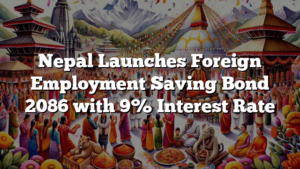
India recently announced the lifting of its ban on onion exports after nearly five months but introduced a minimum export price of $550 per tonne. While this move signifies a positive development for Indian onion farmers, it raises concerns about potential price hikes in the Nepali market.
The Directorate General of Foreign Trade of India issued a notification on Saturday, amending the export policy for onions from “prohibited” to “free,” subject to the specified minimum export price. This decision takes immediate effect and will remain in place until further notice.
Nepali traders anticipate that the imposition of the minimum export price could lead to a significant increase in onion prices, potentially exceeding Rs100 per kg. Mohan Baniya, president of the Potato-Onion Import-Export and Wholesaler Association, highlights that additional costs such as transportation expenses and value-added tax (VAT) imposed by the Nepalese government on imported vegetables could further elevate prices.
Currently, onions are priced at Rs60 per kg in the wholesale market and Rs90 per kg at retail outlets. Despite India’s previous ban on onion exports since December, the Nepali market has remained well-supplied, partly due to illegal imports.
Binay Shrestha, information officer at the Kalimati Fruits and Vegetable Market Development Board, notes that while onion supply remained stable during India’s export ban, the introduction of the minimum export price may lead to price fluctuations.
India’s decision to lift the export ban is attributed to anticipated robust production in 2024, fueled by favorable monsoon conditions. However, concerns persist regarding the potential impact on onion prices in Nepal.
Onions, a staple ingredient in Indian cuisine and a politically sensitive commodity, are cultivated thrice annually in India. Given Nepal’s dependence on Indian onions due to limited domestic cultivation, any disruptions in Indian onion supply significantly affect the Nepali market.
The fluctuation in onion prices is not new to Nepal. Previous export bans and policy changes in India have led to price spikes, triggering smuggling activities across the border.
The recent policy shift in India coincides with the ongoing national elections, with onions historically influencing political dynamics in the country. The decision to lift the export ban has sparked debates, with various stakeholders expressing concerns over its impact on farmers and consumers.
While Indian onion traders and farmers advocate for export opportunities to fetch better prices, the Indian government remains cautious, fearing adverse effects on domestic prices.
Over the years, Nepal has experienced onion price volatility due to external factors, including Indian export policies. The country imported a substantial quantity of onions in the last fiscal year, highlighting its reliance on Indian onion imports.
Related:


